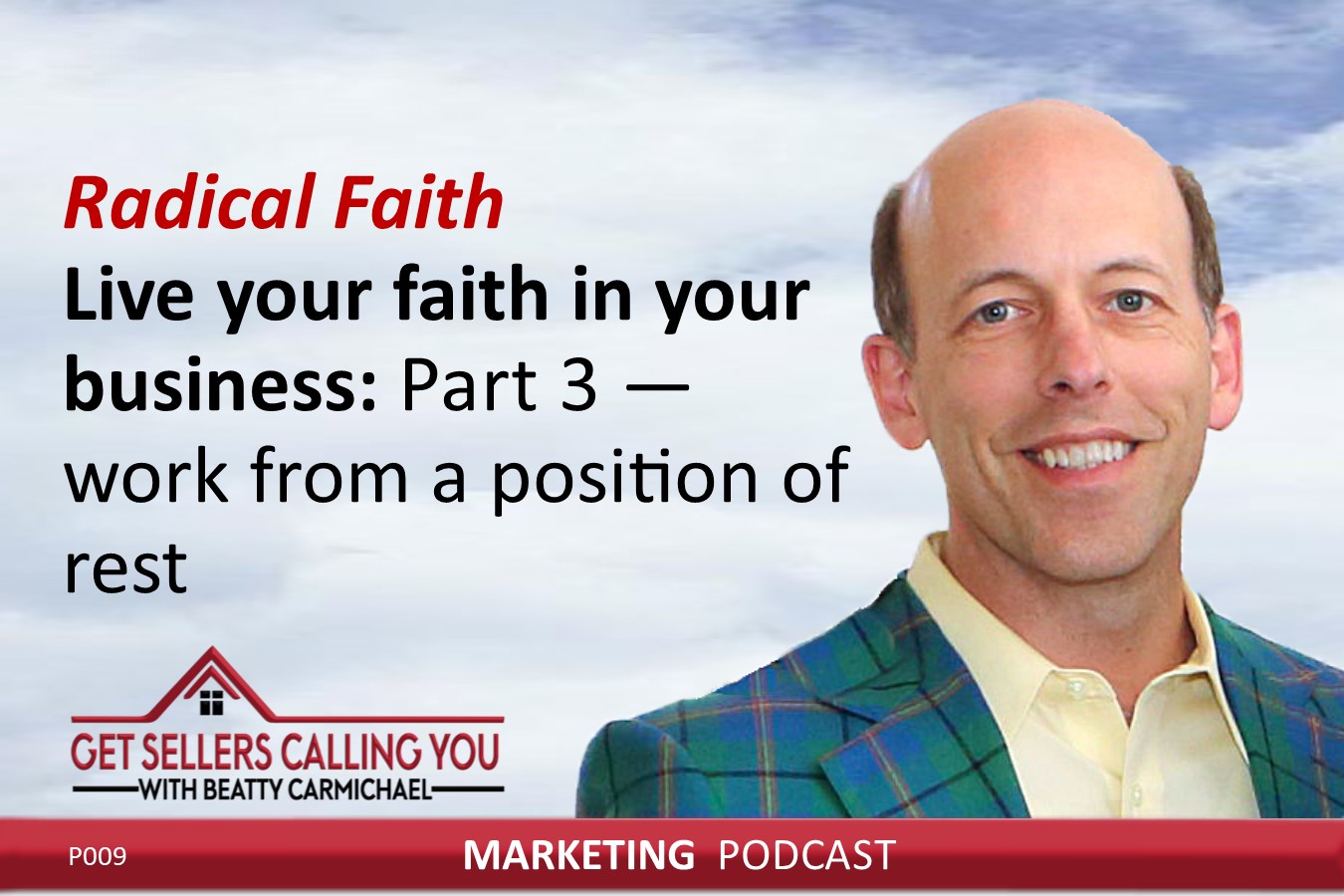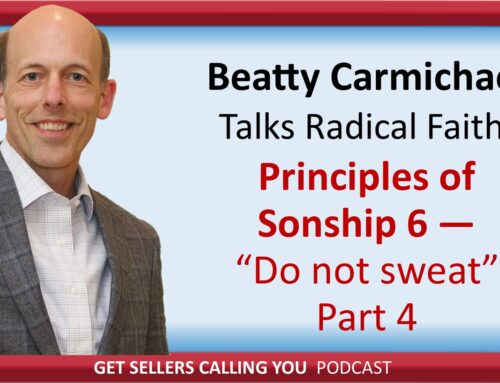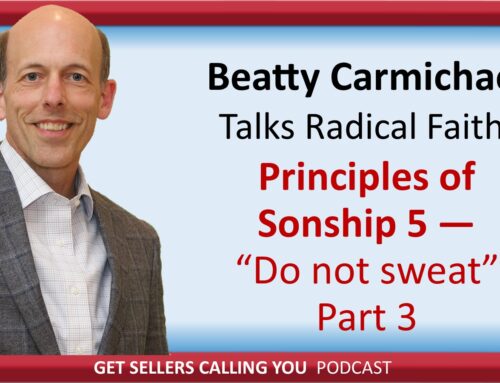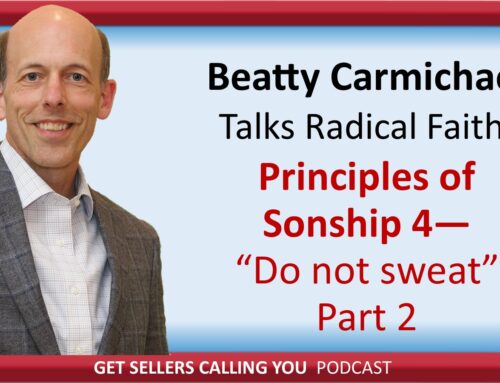Have Questions or Comments? Please ask your questions in the comments section below. We attempt to respond to ALL questions or comments.
Transcript:
Beatty: This is the Get Sellers Calling You Marketing Podcast for real estate agents and I’m Beatty Carmichael. For simple to do, proven marketing strategies focus exclusively on finding sellers and getting more listings, visit our website at Getsellerscallingyou.com and now let’s begin our next session of Get Sellers Calling You.
Caroline: Welcome, I’m Caroline Springer. This is the next session of Get Sellers Calling You, and this is actually our radical faith call. So we’ve had a radial faith series, as an extension from our Get Sellers Calling You Podcast. It’s a little bit of a different podcast topic. We’re going to be interviewing Beatty Carmichael. Beatty’s the CEO of Master Grabber and the creator of Agent Dominator. He’s one of the top marketing experts in the real estate field. As you’ve been following along with us, he has been a Christian for most of his life, and has incorporated his Christian faith in with his business very successfully. So, excited that we’re going to continue this conversation, and I think it’s going to be inspirational and a lot we can walk away with. So, welcome Beatty.
Beatty: Welcome, and thank you for having me back. I guess that’s kind of a tongue-in-cheek since I’m the one directing these calls.
Caroline: Well, that’s okay. I’ve really, really enjoyed our conversations in these radical faith calls, so I’m excited to continue on.
Beatty: Well, I am too.
Caroline: Today we are actually gonna be exploring into talking about the topic of rest, and how to work from a place of rest which I think is going to be really interesting ’cause I know that in our minds those are probably two conflicting words. But isn’t it always, that in the kingdom things kind of work a little bit backwards. So, it’s a good thing to renew our minds to think like Christ. I’m excited to hear what you have to share on that.
Beatty: Okay, I am too. This is definitely a work in progress on my end, but something that has really been near to my heart as I’ve been learning more about it. So the idea is, how do you work from a position of rest. What does that really … first off, what is it? And what does it really mean, and what are the implications? So hopefully I’ll do this topic justice on today’s call. And if I say anything that you don’t think is quite accurate, then feel free to speak up and tell me, because again it’s still … it’s one of those concepts, it’s hard to grasp, because like you mentioned, it’s in the kingdom, everything is kind of opposite. If you want to be greatest, you have to me the least. If you want to be rich, you have to be poor. If you want joy, you have to mourn. And what I’ve heard people say in the upside down kingdom, everything’s just totally opposite. And so this concept of working but resting. What does that really mean?
So I’d like to take you on kind of the journey I’ve been on and try to open up where I think all this kinda goes and what it means to us as believers. So does that work with you, Caroline?
Caroline: Yeah, that works. That sounds great and I think, like I said earlier, I think it’s gonna be something that’s really inspiring and challenging for all of our listeners. So, yeah. I say let’s go for it.
Beatty: All right. So I think there are a lot of things that kind of converge. Let me ask you a few questions, is there anything good we have as Christians that does not come from God?
Caroline: No.
Beatty: Okay good.
Caroline: Everything good comes from God, yes.
Beatty: Everything good comes from God. So, if I’m a realtor, and I’m out there selling homes, then those clients that I have and the increase in clients, if I get them. Is that coming from God or coming from me?
Caroline: Absolutely, I mean I think we can see God’s hand in everything, and we can attribute every part of our success both professionally and every aspect of our life’s billboard. I think we just have to open up our eyes to see it. I think a lot of times it’s so easy to just keep going on through life, and just think like, oh well I got this client through this person, and then, versus slowing down and kind of taking that birds-eye view of saying, “Okay, God. Where’s your hand? Where are you directing? What are you doing?” And so, if we look at it from that kind of birds-eye view, we can see the Lord in it a lot more, and that’s when we see, wow, everything really is from him. Down to my clients. Down to the person that checked me out at the grocery store. Everything is on purpose with him.
Beatty: Yes, so then let’s take out, so what I’d like to do is kinda take that big 30 thousand view a little bit higher than maybe the birds-eye view, since birds are only at a few hundred feet. Then just kinda zoom in on this, because I think there’s just premises. Okay, so first off we’ve established the premise that everything good comes from the Lord. We’ve established the premise that those clients that I have come from the Lord. But then we have this conundrum of if the Lord is bringing me the clients, then what about my work? What about the labors I put into it? And this has been the conundrum for me. Trying to understand, that’s the intersection of what I do in labor, versus what God does in blessing. Okay? Because if it all comes from God, then I can labor without worry, because I know I’m going to receive the blessing. But if it doesn’t all come from God, or if in my heart I say it comes from God, but intellectually I don’t quite grasp it, then I still look at all my labor as what’s causing the result. Does that kinda make sense?
Caroline: Absolutely, I mean I think that’s a human, natural thing to think it’s my hands and it’s my labor that’s causing this to happen, but like you said, I think there’s more to it, and there’s more that we can receive from God it in. I think that makes sense, and that would be a natural response.
Beatty: Okay, so then let’s take that a little bit further and I’m kinda going somewhere, but I’m not sure exactly where I’m going yet, but I’m in the right direction. So, we take this understanding that it all comes from the Lord. There is some element of our need to do work, but what does that work actually do? So let’s talk in terms of getting new clients for a moment.
Clients buy. Buying leads, or doing some sort of marketing to their contacts and people call them up, or they do other marketing like into maybe a geographic farm, and they’re generating their own leads. The question is, how much of what you do actually causes that person to respond? So think about this, if it’s up to us then the result is up to us, but we have no control over the result of whether or not someone responds. All we have control over is do we do the work? Do we pay the money for a lead? Do we send out postcards? Do we do marketing? But ultimately, whether or not someone responds to that, while we have some ability to impact it in terms of what we say in our marketing, ultimately the heart of the person who receives the marketing that then responds to us, we’re completely out of control and out of touch with being able to influence that. Am I making sense on that.
Caroline: Absolutely, I mean I think I know that those are the typical ways that realtor would get leads and get clients, and yet your right. At the end of the day, it is out of our hands. You know, out of our control, how they respond. So, I’m following along.
Beatty: Okay, so it’s out of our hands, and yet we tend to think that it’s all in our hands. When we work and we get totally frustrated, stressed out, because it’s the old adage, if it’s to be, it’s up to me. So if it’s not happening, then there must be something wrong with me, and we work harder, and harder, and harder, and rarely do we get any further down the road. So, we may say that all good things come from the Lord, but then we’re really saying, “Okay, so Lord where are those good things? ‘Cause I’m still waiting on them.” And so we’re back in that conundrum. So with that kind of a backdrop, I want to walk you through what I’ve recently been going through.
So I decided to do a study. And the study, I’ve labeled it, what’s our identity in Christ? What does it mean to be a Christian? What do the scriptures say? So let me see if this makes sense. Let’s talk about Eden. Okay, the garden of Eden. Did the garden of Eden produce good fruit and abundant fruit all the time?
Caroline: Yes, it did. More than enough.
Beatty: All right. More than enough. Did Adam have anything to do with whether or not it produced fruit?
Caroline: Yes, he did. It says that he worked the land, but that his work, I know that when I’ve studied in Genesis that his work was labeled as more of a worship than just the typical work.
Beatty: Right. All right, so now, and I think I’m correct on this. Doesn’t Genesis say that Eden produced fruit and then God placed Adam in the garden?
Caroline: Yes. Mm-hmm (affirmative) That’s true.
Beatty: Okay, so watch this for a moment. God creates the perfect environment. His environment, and that environment, the garden of Eden is already producing fruit. Then he places man into the garden, so let me go back to my question to you. If the garden was already producing fruit, then did man have anything to do with the fruit that it produced?
Caroline: Yeah, I would guess not. Right?
Beatty: Right. Okay. If all good things come from God, then even the production of the garden came from God. It says that man placed Adam there to tend the garden, but it was already producing fruit before Adam got there. Okay, so bear with me for just a moment on this, because … Let’s jump into a completely different topic, but similar topic. A farmer. A farmer goes out there. He plows the field. He puts in seed. Does he do anything to cause the fruit to grow and produce and develop the harvest?
Caroline: Yes, I mean I don’t know much about farming, but yes. He tends the land. He waters the land. He keeps bugs away and things like that, so yes he does-
Beatty: So you’re thinking of modern farming where they are developing even more fruit. But think about just old farmer back in the before any technology. They go out there. They plow the land. They put in the seed, and then what do they do? They pray for rain.
Caroline: Hope.
Beatty: Right.
Caroline: Right. They wait and pray.
Beatty: They pray for not too much rain but not too little. Are they in any control at all in terms of how much fruit they get?
Caroline: No, yep they’re not.
Beatty: -[inaudible 00:13:02]
All they do.
Caroline: Other than I guess the-
Beatty: That’s right. Other than planting of the seeds. So in the garden of Eden, the seeds were already planted. The garden was already producing. Adam was made in the image of God. Correct?
Caroline: Correct.
Beatty: Okay. So now we have a picture of what man in right relationship with God is all about. Man, meaning man and woman, ’cause the bible is clear that when he says he created man in his image and he made then male and female, so we know that both man and woman is the term man. So man, in right relationship with God, is in an area of paradise where there’s an abundant fruit and all man has to do, is tend the garden, but the fruit comes not because of the tending, but the fruit comes because of God who declared that it would be there. Okay? Do we have the backdrop of what man and right relationship with the Lord is all about?
Caroline: Oh, are you asking? Yes [crosstalk 00:14:16]. I think that was a really good-
Beatty: Okay.
Caroline: -set up and backdrop and things I hadn’t even really necessarily thought out before, so I like where we’re going.
Beatty: All right. Okay, cool. So now let’s take it the next step. Man sinned, and that sin causes a break in the relationship with the Lord. Not only does he disobey God, but now he’s embarrassed to be around God, and he hides himself from God. God then creates a sacrifice that causes them to restore some of the fellowship because he clothes them with animal skins which is the sacrifice, and now they’re about to be around the Lord without being embarrassed, but something else happens. What does God do to man?
Caroline: He takes them out of the garden.
Beatty: That’s right.
Caroline: Does that work?
Beatty: Takes them out of the garden and then he does something else. What’s man’s role now? Once he gets out of the garden, what must made do?
Caroline: Oh, to work the land.
Beatty: That’s right. Not only, work the land, but God curses the land so it won’t produce. And so that means now man has to work, and labor, and toil all day long for less provision than he was receiving in the garden when all he had to do was tend it and God provided everything. Okay? So here we have in Genesis we have the image of man in right relationship with God, and what that environment is to look like is to look like great abundant provision in all things with limited labor and God producing it all. All man does is a token amount of tending it. Then, after the fall, because of sin, man is booting out of that perfect location, that perfect spot, and now man has to toil, and sweat, and labor all day long against a cursed ground that doesn’t want to yield its fruit. And now provision becomes a struggle. Okay?
Then let’s fast-forward. We have the exodus, and God calls a certain group of people to be priests. What was the role of the priests? Do you remember?
Caroline: To bring about the atonement of sacrifice and to keep the relationship with God for the people.
Beatty: That’s right. It’s the sacrifice to provide atonement, but their role is to interact with the Lord and then communicate that interaction with the people. What did they do for provision? Do you recall?
Caroline: The priest?
Beatty: Do what?
Caroline: What did the priests do for provision?
Beatty: Yeah, how did they get food to eat and live on?
Caroline: I don’t recall that answer actually.
Beatty: All right.
Caroline: I might need you to help me out on that one.
Beatty: All right. Do you remember a word called the tithe?
Caroline: Oh, yes.
Beatty: Okay, so God said to the 11 tribes, “You get land.” And to the one tribe, the Levites, the priestly tribe, “You get the cities. And you get the pasture land around the cities.” But the people were to go out and labor in the soil and bring a tent of all of their produce to the temple to the priest. And that the priest would eat of the tithe of the land. Okay, does that make sense?
Caroline: Absolutely, no that was a good reminder. I do remember that now that you’re saying it.
Beatty: Okay. So now, here’s what’s really cool. The priest are a shadow of what things were like before the fall. They get to fellowship with the Lord. They simply tend that relationship and all of their provision is met in abundance. Think about this. They have a tenth of 11 people bringing them, they have 11 people taking a tenth and bringing it to one person, so they have a greater abundance than each individual out there. So 11 tribes, a tenth of the provision goes to one tribe. Follow me? So that one tribe of priests actually get a greater amount of provision, and God provides it all that they do not labor for the provision. So that’s a shadow of what it used to be with Adam, and the garden, but I would also say it’s a foreshadow of how God is going to fully restore everything back to how he originally planned it.
So now let’s fast-forward, let me see if I can pull this scripture up real quickly. Let’s look at this. Apologize for the pause as I grab this out. Hopefully this is still fun. Okay, so it says in first Peter 2.9, “that you are chosen race, a royal priesthood, a holy people.” So it says that we’re a royal priesthood. The royal priesthood is what I just described. They fellowship with the Lord and all the provision was provided for them without labor. They did not have to go till the ground in order to make provision happen. So let’s look at the most perfect man in terms of right relationship with God, and that was who?
Caroline: Jesus.
Beatty: There you go. Okay. These are simple answers, good. So Jesus, did he worry at all about any provision in his life?
Caroline: No, nope I mean I don’t-
Beatty: How did he get provision?
Caroline: I know he was a carpenter, so I know he did work, but I know that he always referred to the father providing and never lived in worry or in lack.
Beatty: That’s right. He never lived in worry nor lack. He was man, if we want to use these terms. He was man in right relationship with God. Okay. Not, that’s gonna be far belittling who Christ really is okay? He is God himself. But he modeled man in right relationship with God. And so then at the cross, at the atonement, all of our sins have been paid for. And now we are considered perfect in God’s eyes. The sin, the blight of sin, has been removed from God’s perspective. It says that he sees we’ve been washed by the blood of Christ. That we are without condemnation. It says that sins have been forgiven. So that’s all sins past, present, future. And we are as Christ in the way that God sees us.
In fact, it even says at the resurrection, we will be like Christ himself. So now we have this picture that from God perspective, he sees us as he saw Adam before the fall. Made perfectly in his image, because we’ve been born again. Born of the spirit; not of the flesh. Born in that incorruptible spirit that the atonement was in, and we are now in a new relationship with the Lord because of our position in Christ. Does this make sense, or am I losing you?
Caroline: No, I think you’re right on, and I think this is something really powerful that a lot people need to hear, need to know like the position in how we’re seen ’cause there’s so much scripture to back that up. The righteousness of Christ that we have now, and that we no longer have a sin nature. We now have the nature of Christ. But I think so often the church just maybe is afraid of declaring that, and so often there’s such a withholding of some of the truth that you’re saying of just what our nature is and how we are seen now through the blood of Jesus. I’m with you.
Beatty: It’s scary.
Caroline: I’m bawling.
Beatty: It’s scary because the implication is difficult to comprehend. So I go to a church that they call us sinners saved by grace. I have a friend who calls herself a saint, because the bible says, “To all the saints and” okay like “all the saints in Philippi” I’m not sure if that’s how Paul phrases it, but we’re called saints. My pastor corrected her said, “No, you’re not a saint. You’re a sinner saved by grace.” The question is from which perspective are you looking? Are you looking at man’s perspective or God’s perspective? So let’s look at God’s perspective. We’re gonna run out of time. We’ll have to continue this. But if you look at us from God’s perspective, we’re saints. We are fully restored in relationship. And he calls us royal priests, the royal priesthood. And he showed what royal priests are all about. They do not labor for the provision. I’m not advocating that we just sit back and do nothing and God’s gonna give us stuff. But what I’m saying is that there’s an element here that says all good that we have comes from the Lord. All we have to do is enough work that allows him to work with us.
So here’s a principle that we’ll develop on another time. But you see this with Elijah and the widow during the drought of Ahab. God calls Elijah to go to widow in Cidan or Zarephath and he says, “I’ve commanded a widow to provide for you.” Well she knew nothing about that command. Okay. Elijah comes up and says, “Give me some food.” She said, “I only have enough oil and flour to last for one last meal for me and my son, and then we’ll die.” He said, “No, no, no, no. Here’s the word of the Lord. Make me a bread cake first and then one for you and your son and the flour and the oil will not exhaust itself and extinguish until the rains come.” And so she obeyed the Lord. She took the little that she had, and she acted by faith, and did just what God said, and God produced enough flour and oil on an ongoing basis to fully take care of her and her son for several years.
You see the same thing happening with Jesus feeding the five thousand. So he’s out on the hillside, all these thousands of people, they’re hungry. He tells his disciples, “What should we give them to eat?”
And they say, “Well we have nothing. Should we go into the town?”
And he said, “Well, what do you have?”
And someone says, “Look here’s a little boy five loaves and two fish.”
And Jesus says, “That’s enough.” And he takes the little that man had to contribute and produced the abundance that was needed to fill the need. And we see this pattern in scriptures all the time. And so here’s the idea of working from a position of rest. The idea of working from a position of rest is not that you have to be scared and anxious and toil hard and hard to try to provide a living for you and your family.
Whether you’re in real estate or whether you’re in anything else, working from a position of rest is saying that I’ve been purchased for price. I’ve been redeemed. That price was not cheap. It was the price of God’s son. I have been cleansed. I have been restored in that fellowship essentially in a spiritual sense in that perfect fellowship and my father is the great provider. All I have to do is diligent work that he’s called me to do, but I leave all the results up to him. ‘Cause there’s nothing I can do to impact the results beyond just whatever it is that I do.
And that I think is kinda how I sense the concept of working from a position of rest. It’s not that you rest from your labors. You know, we still get up, and we still work. But it’s that you rest from the worry of will your labors produce. That you can trust your father in heaven to give you all that you need. To provide and abundance for what you need. For what you desire. Because that’s his good favor because he loves you. He calls you a royal priesthood, and a holy nation, a holy individual. Holy means to be completely set apart for him and for his pleasure. And that is working from a position of rest. I don’t know if that’s clear or makes sense. Give me some feedback.
Caroline: No, it is. It absolutely is. I thought painting that picture of what our history and what we can source from is hugely powerful just to connect even with old testament and where this originally were and where God is restoring us back to. But I think that’s such a huge takeaway of the difference between working with a worry of providing for yourself versus working with a trust to know that God will provide. So, no I was completely following, and I think that’s really powerful and challenging, because that’s very alternative to our flesh which is live more from a state of control and more from a state of fear just naturally even if I think sometimes people don’t like the word fear and so they’re like, I’m not fearful. I think that’s the root of some of that toil and some of that control and needing to kind of working from that place versus working from a root of a place of rest and trust in who your father is. So I think that was … it’s a huge concept that is really powerful and will transform your whole life from the position that you live from. So, I think that was great. We are about out of time. Sorry, you were going to add something?
Beatty: Let me make one final comment.
Caroline: Yeah.
Beatty: Because I think it’s important. Because these are these things I’ve been kind of learning myself. The scripture tell us to renew your minds and be transformed in the image of Christ. And what does it mean to renew your mind? Here’s what I think in a very simplistic term it means. It means believing God’s word and trusting in it. And the first step in believing it and trusting what it says is to know what it says. And once you understand what God’s word says about these various topics, then you can trust God’s word, and then you can be renewed. And I think that’s all it is. And this working from a position of rest is all about working from a renewed mind. One that sees things from God’s perspective not from man’s perspective. So I’ll look forward to our next call on this type of topic. This time definitely goes by pretty quick, so I’ll let you wrap it up.
Caroline: It does. That’s okay though. I think it’s, like I’ve probably said before, there’s just so much that we could cover and so much content of where we could go, so I think it’s better to run out of time then to not have enough. So, yeah we are about out of time. I need to wrap up the call. Beatty thank you so much for your time and just sharing your heart and just even where, I know you said, you’re still learning and growing in this, and I love that even in the process, I think that’s so important to share and to know that we’re always learning. There’s always more in God. There’s always more we can receive in God no matter how long we’ve been on this earth and how long we’ve walked with him, so thank you just for your openness and willingness to share today.
Beatty: Yeah, my pleasure. Thank you.
If you’ve enjoyed this podcast, please tell others about it. Also, be sure to get our step by step training on how to double sales and referrals from past clients and sphere of influence. It’s absolutely the easiest way to grow your business fast and is completely free. You’ll find it on our website at Getsellerscallingyou.com. Thanks for listening.
P010








Leave A Comment